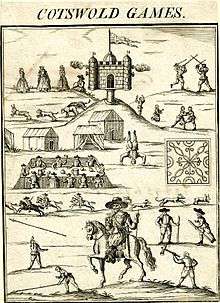Robert Dover (Cotswold Games)
Robert Dover (1575/82–1652) was an English attorney, author and wit, best known as the founder and for many years the director of the Cotswold Olimpick Games.[1]

He was probably born between 1575 and 1582 in Norfolk,[2] one of four children sired by a John Dover, but as the parish registers in Great Ellingham did not begin until 1630 it is impossible to be certain. Dover was a scholar at the University of Cambridge in 1595,[3] possibly as a sizar at Queens' College:[4] during his time at Cambridge the "Gog Magog Games" were held on the Gog Magog Hills outside Cambridge,[5] although it is not known whether these were already being termed "Olympik" as was the case by 1620.[3][6] Dover left university early to avoid swearing the Oath of Supremacy, and a Robert Dover was among those questioned by Lord Burghley's officers looking for recusants in Norfolk.[2] On 27 February 1605 Dover was admitted to Gray's Inn, and was probably called to the bar in 1611.[7] Dover was known as a wit, and author of a lost poem The Wandering Jew: according to Peter Heylin, a pageant put on at Gray's Inn.[2] In 1611 he moved to Saintbury, near Chipping Campden.[2] After the inauguration of the Games, he obtained patronage from neighbour Endymion Porter, a well-connected courtier, who arranged for Dover to receive a cast-off set of royal garments to wear while presiding.[8] Later in life he moved to Barton-on-the-Heath.[8]
Dover founded his annual Games held in the Cotwsold hills above Chipping Campden in about 1612,[3] and presided over them for forty years.[9] A mixture of courtly and folk events, the Cotswold Olimpicks were so named in Annalia Dubrensia, one of a series of literary celebrations of the events.[10] The games consisted of cudgel-playing, wrestling, running at the quintain, jumping, casting the bar and hammer, hand-ball, gymnastics, rural dances and games and horse-racing, the winners in which received valuable prizes.[1] The Games were interrupted by the outbreak of the English Civil War in 1642.[11] Revived after the Restoration, the Games continued until 1852, and were again revived in 1965.
In 1610 Dover married Sibilla Sanford, daughter of William Cole, Dean of Lincoln[8] and widow of John Sanford of Stow on the Wold;[12] they had two sons (Robert, died in infancy, and John, 1614–1696) and two daughters (Sibella and Abigail).[13][14] Robert Dover was buried at Barton on 24 July 1652[15](the date of 6 June 1641 appears to be a mistake[16]).
There is a monument to Robert Dover at Dover's Hill, near Aston-sub-Edge.[17]
References
- Chisholm, Hugh, ed. (1911). . Encyclopædia Britannica. 8 (11th ed.). Cambridge University Press. p. 453.
- Williams, Jean (2009). "The Curious Mystery of the Cotswold 'Olimpick' Games: Did Shakespeare Know Dover ... and Does it Matter?". Sport in History. Routledge. 29 (2): 150–170. doi:10.1080/17460260902872602.
- Galligan, Frank (2000). Advanced PE for Edexcel. Heinemann. p. 59. ISBN 0-435-50643-9.
- "Robert Dover (DVR595R)". A Cambridge Alumni Database. University of Cambridge. (one of three entries under the name "Robert Dover")
- Porter, Enid (1969). Cambridgeshire customs and folklore: with Fenland material provided. Taylor & Francis. p. 186. ISBN 0-7100-6201-X.
- Marsden, J.H. (1851). College life in the time of James the first, as illustrated by an unpublished diary of Sir Symonds D'Ewes. John W. Parker. p. 110.
- Burns, F. D. A. (2004). "Dover, Robert (1581/2–1652)". Oxford Dictionary of National Biography. Oxford Dictionary of National Biography (online ed.). Oxford University Press. doi:10.1093/ref:odnb/7954. Retrieved 29 June 2010. (Subscription or UK public library membership required.) (subscription required)
- Palmer, Alan Warwick; Palmer, Veronica (1999). Who's Who in Shakespeare's England. Palgrave Macmillan. p. 68. ISBN 0-312-22086-3.
- Granger, James (1824). A biographical history of England: from Egbert the Great to the revolution: consisting of characters disposed in different classes, and adapted to a methodical catalogue of engraved British heads: intended as an essay towards reducing our biography to system, and a help to the knowledge of portraits: interspersed with a variety of anecdotes, and memoirs of a great number of persons (5th ed.). W. Baynes and Son. p. 240.
- Girginov, Vassil; Parry, Jim (2005). The Olympic games explained: a student guide to the evolution of the modern Olympic games. Student sport studies. Routledge. p. 37. ISBN 0-415-34604-5.
- Haddon, Celia (2004). The First Ever English Olimpick Games. Hodder & Stoughton. p. 152. ISBN 0-340-86274-2.
- Whitfield, Christopher (1958). A history of Chipping Campden: and Captain Dover's Olympick Games. Shakespeare Head Press. p. 93.
- Dewhurst, Kenneth (1957). The quicksilver doctor: the life and times of Thomas Dover, physician and adventurer. Wright. pp. 5–6.
- Nixon, J. A. (1913). "Further Notes on Thomas Dover". Proceedings of the Royal Society of Medicine. 6(Sect Hist Med): 233–237. doi:10.1177/003591571300601517.
- Powell, John Williams Damer (1930). Bristol privateers and ships of war. J. W. Arrowsmith. p. 130.
- "Thomas Dover, Physician and Cirumnavigator". British Medical Journal: 619. 22 March 1913.
- Verey, David (1979). "Gloucestershire: The Cotswolds". In Pevsner, Nikolaus (ed.). The Buildings of England (2 ed.). p. 92. ISBN 0-14-071040-X.